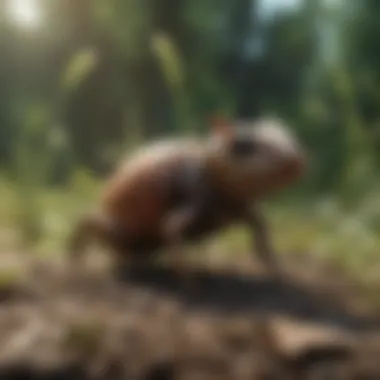Exploring the Complex Relationship Between Farming Practices and Ecosystems


Overview of the Topic
Farming exerts a profound influence on the environment, shaping landscapes and impacting ecosystems in a myriad of ways. This section delves into the intricate effects of agricultural practices on the delicate balance of nature. By exploring key aspects such as land use, water consumption, pesticide application, and biodiversity, a comprehensive understanding of the environmental implications of modern farming can be elucidated.
Current Status and Challenges
In dissecting the current state of the environment in relation to farming, it becomes evident that various challenges and threats loom over the sustainability of agricultural practices. The unchecked expansion of arable land, excess water usage, indiscriminate pesticide use, and biodiversity loss all pose significant challenges to environmental integrity and ecosystem resilience.
Sustainable Solutions
To address the pressing issues at hand, exploring sustainable practices becomes imperative. Implementing eco-conscious farming methods, promoting water conservation strategies, reducing pesticide reliance, and fostering biodiversity-friendly approaches are crucial steps towards mitigating the environmental impact of farming. Drawing from successful case studies and exemplary instances of effective resource management, feasible solutions can be implemented.
Impact and Importance
The ramifications of farming on ecosystems, communities, and future generations are profound. The analysis of its impact unveils a complex web of interdependence between agriculture and the environment. Emphasizing the critical significance of conservation efforts and advocating for sustainable resource management is paramount in safeguarding the delicate balance of nature and ensuring a resilient future for all.
Introduction
In delving into the intricate effects of farming practices on the environment, it becomes imperative to comprehend how agricultural activities can significantly influence ecosystems both positively and negatively. This article serves as a comprehensive guide, exploring various critical aspects like land use, water consumption, pesticide application, and biodiversity to provide a holistic understanding of the environmental implications of modern farming.
Overview of Farming
Farming, as a vital human activity, involves cultivating land for the production of food, fibers, and other resources essential for sustenance and economic development. It encompasses a broad range of agricultural practices, from traditional methods to modern technologies, all shaping the landscapes we inhabit and the natural resources we rely on.
Significance of Studying Farming Effects
The study of farming effects is crucial due to the direct impact agricultural practices have on the environment. By understanding how farming activities influence soil health, water quality, and biodiversity, we can implement strategies to mitigate negative consequences and optimize the positive outcomes of agricultural production.
Purpose of the Article
Positive Impact of Farming on the Environment
In this extensive examination of the impacts of farming on the environment, one crucial aspect that cannot be overlooked is the positive contributions that agricultural practices can offer. Farming, when done sustainably and responsibly, plays a vital role in soil enrichment, carbon sequestration, and economic stability. These elements are pivotal in maintaining ecological balance and fostering a healthy environment.


Soil Enrichment
Soil enrichment stands at the core of sustainable farming practices. By incorporating organic matter, such as compost and manure, into the soil, farmers can enhance its fertility and improve crop yields. This process also aids in retaining moisture, reducing erosion, and promoting microbial diversity, creating a more resilient and productive agricultural system. Moreover, enriched soil plays a crucial role in carbon sequestration, thereby mitigating climate change effects.
Carbon Sequestration
One of the significant benefits of farming on the environment is its role in carbon sequestration. Plants absorb carbon dioxide during photosynthesis, converting it into organic matter and storing it in the soil. This not only reduces greenhouse gas levels in the atmosphere but also helps in improving soil quality and fertility. Sustainable farming practices that emphasize carbon sequestration not only benefit the environment but also contribute to mitigating climate change impacts.
Economic Contributions
Apart from its environmental benefits, farming also plays a crucial role in sustaining economies. Agricultural activities provide livelihoods for millions worldwide, contributing to food security and economic stability. Moreover, the agricultural sector fuels various industries, including food processing, agribusiness, and rural development. By generating income opportunities and supporting local communities, farming proves to be a cornerstone of socio-economic advancement along with its environmental significance.
Negative Impact of Farming on the Environment
In delving into the intricate effects of farming on the environment, it is fundamental to comprehend the negative impact of such agricultural practices. This section focuses on unraveling the adverse consequences that farming can have on ecosystems, shedding light on the significant repercussions it poses in the realm of environmental conservation. By examining the detrimental effects of farming, we can gain a holistic understanding of the need for sustainable agricultural practices to mitigate these drawbacks.
Deforestation
Deforestation stands as one of the foremost negative impacts of farming on the environment. As agricultural activities necessitate vast swathes of land for cultivation, this often leads to the clearing of forests, disrupting intricate ecosystems and endangering numerous plant and animal species. The depletion of forests not only diminishes carbon sequestration capabilities but also contributes to habitat loss and fragmentation, leading to a cascading effect on biodiversity. Addressing deforestation is imperative in fostering a balanced coexistence between agriculture and the preservation of vital ecosystems.
Water Pollution
Another critical facet of the negative impact of farming on the environment is water pollution. Agricultural runoff containing pesticides, fertilizers, and other chemicals can contaminate water bodies, posing substantial risks to aquatic life and human health. Excessive nutrient runoff from farmlands can result in eutrophication, causing oxygen depletion in water sources and leading to detrimental algal blooms. Mitigating water pollution from agricultural activities is crucial in safeguarding the integrity of freshwater ecosystems and ensuring sustainable water resources for future generations.
Loss of Biodiversity
The loss of biodiversity is a significant repercussion of farming practices on the environment. Mono-crop cultivation and land conversion for agriculture can result in the displacement and extinction of native species, disrupting delicate ecological balances. Introducing invasive species through agricultural practices further exacerbates biodiversity loss by outcompeting indigenous flora and fauna. Preserving biodiversity is essential for enhancing ecosystem resilience and maintaining the functionality of natural habitats in the face of increasing agricultural expansion.
Land Use Changes
Expansion of Agricultural Land
Expanding agricultural land is a fundamental practice in the realm of farming that warrants thorough examination. This process involves the conversion of previously untouched or alternative use land into areas designated for agricultural production. The expansion is often driven by the growing demand for food due to population increase or economic factors. However, this expansion can lead to deforestation, habitat loss for wildlife, and disruption of local ecosystems. It is crucial to consider the long-term effects of agricultural land expansion on the environment, including soil degradation, water resource management, and greenhouse gas emissions. Sustainable land use practices and strategic planning are essential to mitigate the negative impacts of this expansion and ensure environmental conservation.
Conversion of Natural Habitats


The conversion of natural habitats for agricultural purposes is a significant concern in the discussion of farming's impact on the environment. As agricultural activities encroach upon natural ecosystems such as forests, wetlands, or grasslands, the biodiversity of these areas is threatened. Conversion of natural habitats can lead to the loss of native species, disruption of ecological processes, and fragmentation of landscapes. The conversion process often involves clearing land, draining wetlands, or removing vegetation, which can result in irreversible damage to the environment. It is essential to carefully evaluate the trade-offs between agricultural expansion and habitat conservation to promote sustainable land use practices and preserve ecological diversity.
Water Usage in Farming
Water usage in farming is a pivotal aspect of agricultural activities, playing a crucial role in crop production and sustainability. The significance of water in farming cannot be overstated, as it directly impacts crop growth, soil health, and overall agricultural productivity. Efficient water management is essential to ensure that crops receive an adequate amount of water without leading to wastage or environmental harm.
Irrigation Practices
Irrigation practices in farming encompass a variety of techniques used to supply water to crops. From traditional methods like flood irrigation to modern systems such as drip irrigation, farmers employ different approaches based on crop type, soil composition, and water availability. The choice of irrigation method significantly affects water efficiency, crop yield, and nutrient uptake by plants. Sustainable irrigation practices aim to optimize water usage, minimize runoff, and reduce energy consumption.
Impact on Aquatic Ecosystems
The impact of water usage in farming extends beyond agricultural fields and directly influences aquatic ecosystems. Excessive water extraction for irrigation can lead to reduced water levels in rivers, lakes, and wetlands, affecting aquatic habitat and biodiversity. Runoff from irrigated fields may carry sediments, pesticides, and fertilizers into water bodies, causing pollution and ecosystem disruption. Balancing the water needs of agriculture with the conservation of aquatic ecosystems is critical to maintaining ecological balance and sustainable water resources.
Chemical Inputs in Agriculture
Chemical Inputs in Agriculture play a critical role in modern farming techniques, contributing to increased agricultural productivity and efficiency. Pesticides, for instance, help mitigate crop losses due to pest infestations, thereby ensuring food security and economic stability for farmers. Fertilizers support soil fertility and nutrient availability, fostering robust plant growth and maximizing harvest yields. These elements underscore the importance of Chemical Inputs in Agriculture in optimizing agricultural output while impacting the environment in varied ways.
In contemplating Chemical Inputs in Agriculture, one must carefully consider the benefits they offer alongside the environmental implications they entail. While these substances boost crop production and food supply, their indiscriminate use can lead to soil degradation, water contamination, and harm to non-target organisms. Therefore, a balanced approach to the application of chemical inputs is vital, emphasizing sustainable practices that minimize environmental harm without compromising agricultural productivity.
Impact on Biodiversity
In the exploration of farming's impact on the environment, the facet of Impact on Biodiversity emerges as a crucial component. Biodiversity, representing the variety and variability of living organisms in a specific habitat, plays a fundamental role in maintaining ecological balance and stability within ecosystems. The discussion on the Impact on Biodiversity within this article aims to shed light on how farming practices can either support or disrupt this delicate equilibrium.
Loss of Native Species
Within the context of farming's influence on biodiversity, the phenomenon of Loss of Native Species warrants significant attention. Through the process of agricultural expansion and intensification, native species are often displaced or driven to extinction, disrupting the intricate web of interdependencies in natural ecosystems. This loss not only impacts the affected species but also cascades to affect other organisms and ecosystem functions, leading to a ripple effect of consequences that can alter entire landscapes.
Introduction of Invasive Species
Moreover, the Introduction of Invasive Species stands out as another critical area to explore in the realm of farming's impact on biodiversity. Agricultural activities can inadvertently introduce non-native species to new environments, where they may outcompete native species, disrupt local ecosystems, and lead to ecological imbalances. These invasive species have the potential to spread aggressively, causing harm to agricultural productivity, ecosystem services, and overall biodiversity. Understanding and addressing the risks associated with the introduction of invasive species is essential in mitigating the negative repercussions on natural habitats and native species.
Mitigation Strategies


Agroforestry Practices
Agroforestry practices involve the integration of trees and shrubs into agricultural landscapes to promote biodiversity, enhance soil health, and provide additional sources of income for farmers. This sustainable approach combines traditional farming methods with forestry techniques, creating a harmonious system that benefits both the environment and agricultural production. Through agroforestry, farmers can protect soil from erosion, sequester carbon, and diversify their agricultural outputs, thereby increasing resilience to environmental changes.
Organic Farming Methods
Organic farming methods focus on cultivating crops without synthetic pesticides or fertilizers, emphasizing sustainable practices that prioritize soil health and biodiversity conservation. By eschewing chemical inputs, organic farming reduces the pollution of water bodies and minimizes risks to human health associated with pesticide exposure. Additionally, organic farming promotes ecological balance by fostering natural pest management and preserving biodiversity, which are essential for the long-term sustainability of agroecosystems.
Sustainable Water Management
Sustainable water management is essential for optimizing agricultural productivity while minimizing the depletion and pollution of water resources. This critical aspect of farming involves efficient water use, proper irrigation techniques, and the protection of aquatic ecosystems from contamination. By implementing water-saving technologies, such as drip irrigation and rainwater harvesting, farmers can reduce water waste and enhance crop yield. Sustainable water management strategies aim to balance the needs of agriculture with the preservation of freshwater resources, ensuring a sustainable future for farming and environmental conservation.
Policy Implications
Policy Implications help establish boundaries and standards within which farmers operate, ensuring that their practices do not severely harm ecosystems. By enforcing regulations and incentives, Policy Implications serve as a catalyst for mitigating the negative impact of farming on the environment. This section sheds light on how policy frameworks can promote responsible agricultural practices while balancing economic considerations.
Exploring Policy Implications offers a nuanced perspective on how governmental intervention can shape the future of agriculture. It highlights the interplay between regulations, enforcement, and the agricultural sector's response, emphasizing the need for adaptive and proactive policies to address emerging environmental challenges.
Government Regulations
Government Regulations play a crucial role in overseeing and managing farming activities to safeguard the environment. These regulations are designed to control and monitor various aspects of agriculture, ranging from land use practices to chemical inputs. Government Regulations aim to ensure that farmers adhere to specified standards and practices that minimize environmental harm.
Governments set regulations to limit the extent of deforestation for agricultural expanses, curtail water pollution from farming activities, and regulate pesticide and fertilizer application. These rules are essential for maintaining ecological balance and preventing the degradation of natural resources. Through stringent enforcement, Governments can monitor compliance and take corrective actions when necessary.
International Agreements
In the global context, International Agreements play a pivotal role in fostering cooperation among nations to address environmental challenges arising from farming practices. These agreements facilitate dialogue and collaboration on issues such as biodiversity conservation, sustainable land management, and water resource protection.
International Agreements promote information exchange, technological sharing, and capacity building to enhance the environmental performance of agricultural systems worldwide. By encouraging alignment on common goals and objectives, these agreements contribute to the harmonization of standards and practices across borders.
Furthermore, International Agreements strengthen the collective commitment to combating climate change, promoting resilient agricultural practices, and preserving biodiversity. They underscore the interconnectedness of global ecosystems and emphasize the shared responsibility of nations in protecting the environment for future generations.
Conclusion
The conclusion section of this article serves a critical purpose in summarizing the intricate effects of farming on the environment. It encapsulates the key findings presented throughout the various sections and subheadings, providing a holistic view of how agricultural practices impact ecosystems. By shedding light on both the positive and negative aspects of farming, the conclusion emphasizes the need for a balanced and sustainable approach to agriculture. It underscores the significance of understanding the environmental implications of modern farming practices to foster awareness and drive towards more environmentally-friendly farming techniques.
Summary of Findings
Call to Action
As the narrative of farming's impact unfolds, the call to action section emerges as a pivotal point of reflection and advocacy. It urges readers to consider the implications of their consumption choices and agricultural practices on the environment. By highlighting the need for greater awareness and proactive measures, the call to action encourages individuals, policymakers, and stakeholders to embrace sustainable farming methods and policies. It promotes a collective effort towards mitigating the adverse effects of farming on the environment, preserving biodiversity, and safeguarding our natural resources for future generations.



